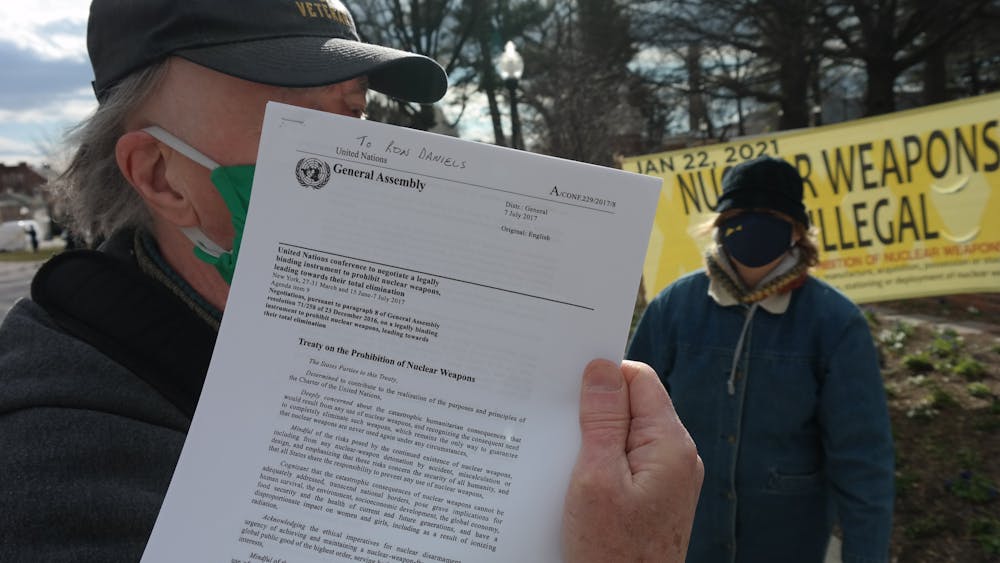Members of Prevent Nuclear War Maryland, a Baltimore-based anti-war, anti-nuclear weapons organization, protested the University’s involvement in nuclear weapons research with the U.S. government on Friday, Jan. 22.
The group also celebrated the ratification of the Treaty on the Prohibition of Nuclear Weapons (TPNW) — a legally binding international treaty prohibiting the development, ownership and deployment of nuclear weapons by nations.
A United Nations working group was formed in 2016 with a mandate to devise legal provisions to create a nuclear-free world. While it was supported by 123 countries, the U.S., the U.K., France and Russia voted against the group alongside Israel, a country that is widely believed to be a nuclear power. China, India and Pakistan abstained.
The working group’s recommendations led to the TPNW, which was adopted on July 7, 2017.
The treaty went into effect on Jan. 22, 2021, 90 days after the 50th nation, Honduras, ratified it. As no nuclear power, including the U.S., is a signatory or a party to the treaty, it was largely a symbolic step in the global movement for nuclear abolitionism.

COURTESY OF CHRIS H. PARK
A car caravan circled the Homewood campus several times throughout the protest.
On Friday, around a dozen protesters held bright yellow banners reading “nuclear weapons are illegal” on the Charles Street median and in front of the marble Hopkins sign on the Merrick Gateway, conversing with passers-by. Protesters criticized the University’s engagement with nuclear weapons research at the Applied Physics Lab (APL).
Hopkins is the top recipient of federal research and development funds, receiving $2.351 billion in a contract from the U.S. Department of Defense (DOD) in 2019. The International Campaign to Abolish Nuclear Weapons identified Hopkins to be one of the universities involved in developing and maintaining the U.S. nuclear arsenal in its 2019 report.
Max Obuszewski, one of the co-founders of Prevent Nuclear War Maryland, said he has been protesting nuclear weapons for over 30 years. He believes that continued development and possession of nuclear weapons poses an existential threat to the world.
“Our government is going to spend trillions of dollars to refurbish the nuclear arsenal. We have to make the legislators give us security, like health care and education. We don’t have any of that,” he said. “What we’re doing now is to shame the United States and the nuclear weapons contractors into joining the treaty.”
Prevent Nuclear War, the parent organization of the group Obuszewski founded, has worked to mobilize support for the “back from the brink” resolution in local and state governments. The resolution calls on the federal government to renounce its nuclear first-use policy, limit presidential authority to launch a nuclear attack, reduce spending on nuclear weapons research and work with other states to eliminate nuclear weapons.
Baltimore was the first major city to endorse its version of the resolution, introduced by then-City Councilman Bill Henry.

Because APL research is classified — unlike work in other University divisions — it is unclear how many of its contracts with the DOD are related to nuclear weapons.
In an email to The News-Letter, Karen Lancaster, the assistant vice president of external relations for the Office of Communications, noted that the APL was a research division of the University, not an academic one, thus is exempt from the University-wide rule on not allowing classified work.
“The Laboratory’s scientists, engineers and analysts serve as trusted advisors and technical experts to the government, ensuring the safety and reliability of complex technologies that safeguard America's security and advance the frontiers of space,“ she wrote.
Lancaster did not comment specifically on APL’s nuclear weapons research program.
Dr. Gwen DuBois, a co-founder of Prevent Nuclear War Maryland, stated that the University should turn its efforts to research that would have immediate positive effects on people’s lives. She is an alum of the Bloomberg School of Public Health and teaches part-time at the School of Medicine.
“Johns Hopkins University of Medicine has played a great role in the COVID-19 pandemic. That is what we expect of this great institution, but not profiting off immoral and illegal weapons,“ she said. “What we want to see from Hopkins is to pull out from contracts with nuclear weapons. Hopkins is knee-deep in this stuff and isn’t transparent.”
Obuszewski also stated that nuclear weapons research is a reckless avenue to allocate University resources.
“We think it’s abominable,“ he said. “Especially in this pandemic, let’s not waste all this money on nuclear weapons.”
DuBois expressed hope that Hopkins students and faculty would pressure the University leaders to stop engaging in this research, citing the impact made by students who protested the now-suspended plans to create a private police force.
“[TPNW] is an opportunity for universities and corporations to reassess what they do. For corporations, it’s going to come from the shareholders. For universities, the pressure’s going to come from the students or professors,“ she said. “There’s nothing that gives us more hope than seeing students help us. If nothing else, if this opens up a dialogue with the University, that would be tremendous: Bring it out into the open and let the University debate this.”

















